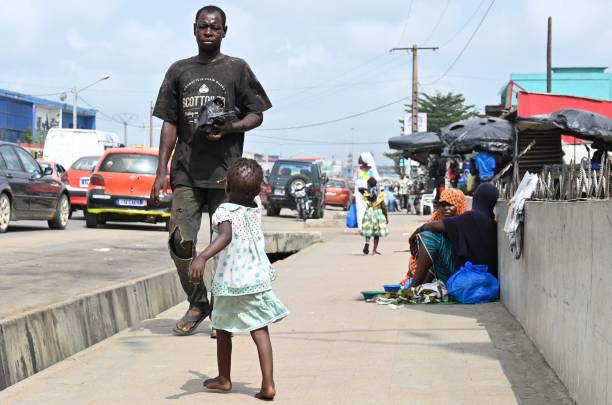
Abuja, Nigeria’s capital, is known for its striking contrasts. On one side, glitzy malls and luxury cars paint a picture of wealth and success. On the other, the streets teem with beggars—men, women, and children hoping for a coin or two from passers-by. Despite ongoing efforts by the Federal Capital Territory (FCT) Administration, street begging continues to rise, turning bustling areas into scenes of human desperation.
In recent years, the presence of beggars at major intersections, shopping centres, airports, and places of worship has become impossible to ignore. Many beggars hold placards sharing their struggles, while others carry infants to draw sympathy. Although government agencies, such as the Abuja Environmental Protection Board (AEPB) and the Social Development Secretariat, have been tasked with addressing this issue, the situation appears to be spiralling out of control. AEPB is responsible for clearing beggars off the streets, while the Social Development Secretariat handles their rehabilitation, but both agencies are overwhelmed by the ever-growing numbers.
A Surge Fuelled by Crisis
The beggars flocking to Abuja mostly hail from Northern Nigeria, driven away from their homes by insurgencies and banditry. Niger, Zamfara, Katsina, Kano, Borno, and Nasarawa are among the states from where these individuals originate. Many of them have lost their homes and loved ones in these crises. Sakinatu Bello, a displaced widow from Nasarawa State, explained to Daily Trust that her husband was kidnapped in Funtua, forcing her to relocate to Abuja. Another widow from Zamfara shared a similar fate – her husband and two children were killed, leaving her with no option but to seek refuge on the streets.
Flashbacks to previous reports of growing insecurity in northern Nigeria paint a grim picture of how dire the situation has become. In 2022, The Times Nigeria reported that over 200,000 people had fled their homes due to banditry in Katsina alone, contributing to a swelling population of internally displaced persons (IDPs). These displaced individuals, unable to find formal housing or employment, often turn to begging for survival.
Abuja: A Perceived Safe Haven
For many of these beggars, Abuja represents hope and safety. Umar Isah from Zamfara told Daily Trust that the capital city is considered one of the safest places in Northern Nigeria, which is why so many displaced individuals gravitate toward it. “If you’re running from Boko Haram or bandits, Abuja is the place to go,” he explained. Beyond safety, the beggars see the capital as a land of opportunity, filled with affluent residents who might help change their circumstances.
However, life in Abuja is far from easy for these beggars. Many, like Bashiru Ibrahim from Jigawa, an amputee, are unable to find formal work. “My uncle brought me here six years ago, promising I could find a job, but I ended up on the streets instead,” he shared. For others, the streets are a daily grind. Sekina, a 27-year-old woman from Niger State, said on a good day, she could make around N4, 000, but there are days she earns far less. Most of their earnings go towards food and, in some cases, paying for shelter in makeshift accommodations.
Residents’ Frustration
As the number of beggars continues to rise, so does frustration among Abuja’s residents. Motorists and pedestrians are often swarmed by beggars, particularly at busy intersections. “It’s overwhelming,” said Sanni Bolaji, a long-time driver in Abuja. “Even when you say no, they persist.”
In 2020, The Times Nigeria published a similar story on the rise of street begging, highlighting the emotional toll it takes on residents. Back then, many Abuja residents had already expressed their concerns, but today, the situation seems worse than ever. Some residents, like Rashida Muhammad, have had unpleasant encounters with beggars. She recalled an instance where a beggar insulted her for offering too little money. Other residents, like Nurudeen Sa’adu, have been victims of theft, with beggars snatching personal belongings in crowded areas.
What Is Being Done?
Despite the challenges, government agencies continue to make efforts to address the situation. The AEPB regularly conducts raids to remove beggars from the streets, but these efforts have had little long-term effect. Many beggars return to the streets shortly after being relocated to rehabilitation centers. The FCT Social Services Development Secretariat has also struggled to provide adequate rehabilitation services, citing limited space and resources.
A member of one of the AEPB task forces shared that while arrests of beggars are made regularly, the numbers keep increasing. The FCT Administration is now exploring alternative strategies to ensure those removed from the streets don’t return.
The Bigger Picture
Street begging in Abuja is a multifaceted issue – one that blends desperation, displacement, and economic hardship. While some beggars are genuine victims of circumstance, others take advantage of the goodwill of residents. Previous reports have even uncovered instances of fraud and criminal activity among certain groups posing as beggars.
As Abuja continues to develop into a thriving metropolis, the city’s streets tell a different story – one of survival in the face of mounting adversity. For many of the beggars, life on the streets may be far from ideal, but for now, it remains their only option.
Source: Daily Trust


